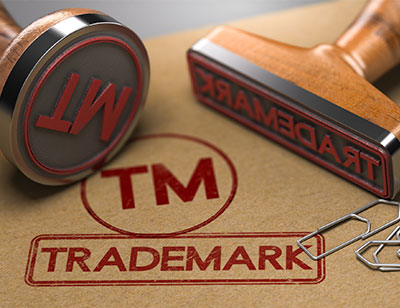
How to Protect Your Brand
It can be hard work starting a new business. From the outset, just identifying the many tasks to address and decisions to be made can be overwhelming. What type of business entity should I form? Do I need a business plan? What should I name my business? Do I need to rent office space, and if so, where? What is the best way to market my business?
Of course, as many business owners will tell you, all of that planning and hard work can be worth it. Aside from the potential financial rewards, most successful business owners enjoy a lifelong sense of satisfaction at having built something they can be proud of. And if you’re really successful, there will be no shortage of competitors trying to emulate your success. While competition should be expected and planned for in any business endeavor, what happens when a competitor crosses the line into unlawful business practices, such as stealing your trade name, logo, formulas, or other trade secrets?
It’s an unfortunate reality: success breeds imitation, and not all of it is legal. Logos and other branding elements, like taglines and product names, are often unlawfully copied by shady bad actors looking to capitalize on your hard work. This isn’t just unfair – it dilutes the value of your brand. Even worse, in cases where the goods and services provided by the bad actor are pale imitations of your own, the unlawful infringement can have a devastating impact on the goodwill you’ve established over time with your customers and clients.
Luckily, there are ways to protect your brand and hold unlawful infringers accountable for any damage to your business and reputation.
Key Steps to Protect Your Logo and Other Branding Elements
The most common way to legally protect your brand is to register a trademark or copyright, or both, to put the entire world on notice of your claim to the exclusive rights in the registered mark or work. While an owner can register both a trademark and copyright for certain intellectual property assets, they are not the same thing. Understanding the differences is an important first step towards making sure your IP assets are properly protected.
Trademark your Unique Branding Elements
A trademark protects words (like a brand name), phrases (like a catchphrase or slogan), or designs (like a logo) that are used to identify a unique source of goods or services and distinguish them from like goods and services available from other sources. The owner of a mark typically has common law rights in the mark, but most business owners are best served by taking the formal step of registering their mark with the United States Patent and Trademark Office (the “USPTO”) or its corresponding agency at the State level, if any. A formal registration with the USPTO provides several benefits, including:
- It constitutes a public record putting the entire world on notice of your exclusive claim to use the mark in commerce as of a fixed date.
- It permits you to enforce your rights nationwide against trademark infringers in federal court and provides for the potential recovery of damages, penalties, and attorneys’ fees and costs.
- It can be used as the basis to add your registered trademark to international registries worldwide, potentially providing global enforcement rights against infringers in other countries.
- It can last forever as long as the owner continues to file all required maintenance forms and pay all required maintenance fees with the USPTO.
While you do not need an attorney to file an application to register your mark with the USPTO, there are several pitfalls that inexperienced business owners face that can delay approval of their mark, preclude a successful registration, or even result in a successful registration that doesn’t provide all the protection the owner seeks. For example, the most common mistake made by first-time trademark applicants is the failure to thoroughly research their mark before filing to ensure there are no potential conflicts with a previously existing mark. A previously existing mark registered in the same class of goods or services will guarantee a denial of your application by the USPTO. Unfortunately, the USPTO has a strict no refund policy, even for innocent mistakes in the application process.
Copyright Your Original Works
Unlike a trademark, copyright is limited to original works of authorship, such as a novel, screenplay, painting, or other work of art. It is intended to protect the unique expression of any original work and can have broad application to things as diverse as websites, fonts, lyrics, and recorded symphonies.
One great feature of copyright is that it automatically attaches when you create something new in a fixed, tangible form. You don’t need to publish it or use it in commerce to have common law rights in your own original works.
However, federal copyright registration provides two very important functions:
- It provides a public record memorializing the date on which you created your work.
- It gives you standing to sue in federal court to enforce the copyright and prevent third-parties from unauthorized use, including the right to recover significant penalties, attorneys’ fees, and costs.
Just as with a trademark registration, registering a copyright can be tricky for the inexperienced layperson. For example, most business owners hire a marketing team or graphic designer to create a logo they can use as part of their business brand. Who can copyright that logo, the business owner, the marketing team, or the original artist? Simply put, a business owner can only claim rights to such work if the work is performed pursuant to a “work for hire” agreement in which the artist acknowledges that, in exchange for consideration paid, they waive any and all claim to ownership in the work.
Carefully Consider All Your Options
Depending on the complexity of your branding and IP assets, protecting your brand might involve a combination of trademarks and copyrights. Having an intellectual property attorney on your side from the very beginning will help you analyze the best available registration options to provide the maximum protection for all of your IP assets and help you enforce your valuable registered IP rights in the event of infringement down the road.
FSKS is On Your Side
If you want to protect your brand, believe a competitor is engaged in the unauthorized use of your IP, or have received a cease and desist letter or complaint accusing you of infringing on the IP of another, please contact us today. Our IP team can help you identify and protect your IP assets, including trademarks, copyrights, patents, trade secrets, and more. And if you are facing accusations of infringement, you will want knowledgeable IP counsel at your side to vigorously defend you. For additional information or to discuss a potential IP claim, defense, registration, or maintenance, please contact Alan Golub (agolub@fskslaw.com) at 973-538-4700.






